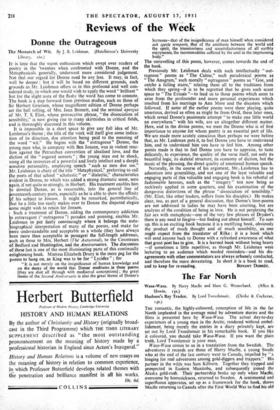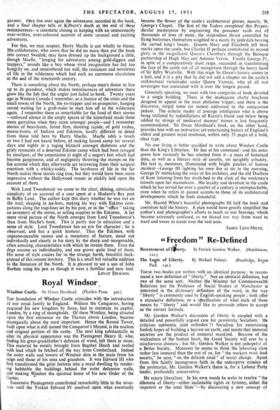The Far North
THE romantic, the highly-coloured, conception of life in, the far North implanted in the average mind by adventure stories and the films is presented here by Wasa-Wasa. The actual day-to-day experiences of a young man in the Arctic, rendered without embel- lishment, being merely the entries in a diary privately kept, are set out by Lord Tweedsmuir in his remarkable book. If you like it coloured, you should take Wasa-Wass. If you want the plain truth, Lord Tweedsmuir is your man.
Wasa-Wasa comes to us in a translation from the Swedish. The adventures it records are those of Harry Macfie, a young Swede who at the end of the last century went to Canada, impelled by " a longing for real adventures among gold-diggers and trappers." His partner in the wilds was Sam Kilburn. Together they trapped and prospected in Eastern Manitoba, and subsequently joined the Alaska gold-rush. Their partnership broke up only when Macfie, overcome by homesickness, returned to Sweden. A sentimental and superfluous apparatus, set up as a -framework for the book, shows Macfie returning to Canada after the First World War to find his old
partner. they live over again the adventures recorded in the book, and a final chapter tells of Kilburn's death at the end of these reminiscences—a cinematic closing in keeping with an unnecessarily over-written, over-coloured account of some unusual and exciting adventures.
• For this, we may suspect, Harry Macfie is not wholly to blame. His collaborator, who avers that he did no more than put the book into correct Swedish, may have dressed up the background a little, though Macfie, " longing for adventures among gold-diggers and trappers," sounds like a boy whose vivid imagination has fed too hungrily on, and remembered too well, the romances and novelettes of life in the wilderness which had such an enormous circulation at the and of the nineteenth century.
There is something about the North, perhaps man's desire to live up to its grandeur, which makes reminiscences of adventure there grow like the fish that the angler just failed toihook. Twenty years ago in Western Canada I remember, as a feature of the cities and the small towns of the North, the ex-trapper and ex-prospector, hanging round waiting for a grub-stake to start him off to the wilderness again. I remember them as remarkable for the fund of their stories —enforced silence in the empty spaces of the hinterland made them more garrulous when they came amongst people—and I remember stories of bear-hunts, forest fires, shooting rapids, of gold rushes, moose-hunts, of Indiaris and Eskimos, hardly different in detail from those told here by Harry Macfie. Macfie adds a touch or two I had not heard before, of making forced camp for several days and nights in a raging blizzard amongst skeletons and the grisly remnants of a deserted Eskimo camp which had been ravaged by smallpox, of the amputation at night of a negro's feet which had become gangrenous, and of negligently throwing the stumps on the fire around which they afterwards sat recovering from their surgical exertions with a whisky-toddy. The harshness of life in the far North makes these stories ring true, but they would have been more impressive without the Hollywood veneer so stickily laid upon the account of them.
With Lord Tweedsmuir we come to the deaf, shining, admirable simplicity of an account of a year spent at a Hudson's Bay post in Baffin Land. The author kept this diary whether he was out on the trail, sleeping in ice-huts, making his way with Eskimo com- panions along the trap-lines set by his post, or in the " office " taking an inventory of the stores, or selling supplies to the Eskimos. A far more vivid picture of the North emerges from Lord Tsyeedsmuir's than from Macfie's book. This is partly due to education and a sense of style. Lord Tweedsmuir has an eye for character ; he is observant, and has a quick humour. Thus the Eskimos, with unpronounceable names and a monotony of feature, stand out individually and clearly in his story by the shirp and recognisable, often amusing, characteristics with which he invests them. Even the dogs assume an individuality, and one grows quite fond of them. His sense of style creates for us the strange, harsh, beautiful back- ground of thii remote territory. This is a small but valuable addition to the literature of the North. It is pleasant to see a son of John Buchan using his pen as though it were a faMiliar and easy tool.
LOVAT DICKSON.































 Previous page
Previous page